 Petzlover
PetzloverBoth Beagle and Toy Bulldog are originated from United Kingdom. Beagle may grow 6 cm / 3 inches higher than Toy Bulldog. Beagle may weigh 7 kg / 15 pounds lesser than Toy Bulldog. Beagle may live 3 years more than Toy Bulldog. Beagle may have more litter size than Toy Bulldog. Both Beagle and Toy Bulldog requires Low Maintenance.
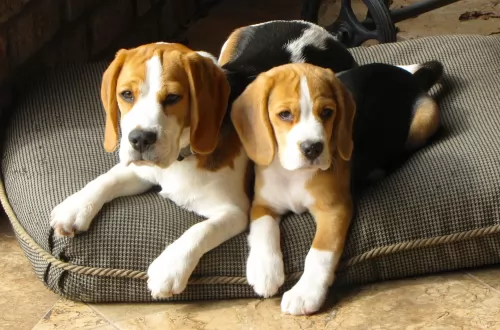 There are some accounts of similar size dogs used for hunting in Greece in 5th century BCE. During 8th century the Talbot Hound breed was created. In 11th century Talbot Hound was brought to England by William the Conqueror. While using in hunting they are found to be a slow runner. To overcome the situation and increase their running speed the hunting people bred Talbot Hound with Grey hounds. The beagles described earlier were very small in size and are said as pocket beagles.
There are some accounts of similar size dogs used for hunting in Greece in 5th century BCE. During 8th century the Talbot Hound breed was created. In 11th century Talbot Hound was brought to England by William the Conqueror. While using in hunting they are found to be a slow runner. To overcome the situation and increase their running speed the hunting people bred Talbot Hound with Grey hounds. The beagles described earlier were very small in size and are said as pocket beagles.
It is believed that the reason for this is that there were different breeding groups working in different directions. One of the groups wanted a smaller dog and there was also an attempt to cross French Bulldogs with Bulldogs to decrease their weight, but this breed was also not developed.
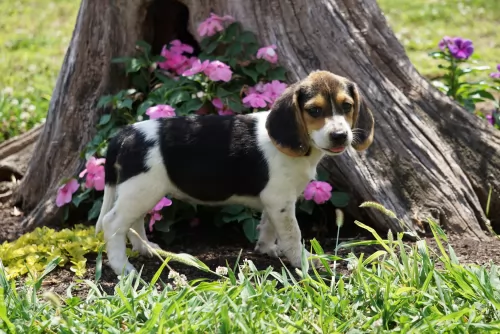 They are small and compact breed, and always happy and fun loving. They should be trained by patient and creative training techniques. Beagles are very much interested in using their nose in finding interesting scents and are food focussed. They always wake their neighbours at 6 am by their half howling. They think everyone is their best friend and love to have friendship with other animals and humans. They have about 220 million scent receptors and are said as "a nose with feet" by humorist Dave Barry.
They are small and compact breed, and always happy and fun loving. They should be trained by patient and creative training techniques. Beagles are very much interested in using their nose in finding interesting scents and are food focussed. They always wake their neighbours at 6 am by their half howling. They think everyone is their best friend and love to have friendship with other animals and humans. They have about 220 million scent receptors and are said as "a nose with feet" by humorist Dave Barry.
We can see beagles at many airports in their duty. They can easily trace out the illegal things being smuggled. Since they are small in size they are suitable for apartment living. But they like to walk around several times. They should be exercised for plenty of time. Obedience training should be given to them by giving food reward. Beagles are wanderers of nature and so if possible they will try to escape. So it is necessary to make them microchipped or to wear a collar, to find them easily.
The Toy Bulldog was a medium sized dog standing at between 25 to 35cm in height and weighing between 11 and 18kg.
The coat of the dog was short and smooth and came in colors such as white and fawn, red or brindle. He had quite a bit of soft skin around the face and neck.
He was a small dog with a large body, short legs, broad muzzle, small ears and a docked tail.
The coat was glossy and short and they had soft skin and hair around the neck and head. They come in a variety of different colors ranging from pale yellow, light fawn to solid red.
The Toy Bulldog was a loyal and affectionate dog towards his human family It’s a pity he became extinct because he was amusing and entertaining, a great friend and companion.
They were calm dogs and didn’t require a lot of space and would have adapted well to life in the city or the countryside.
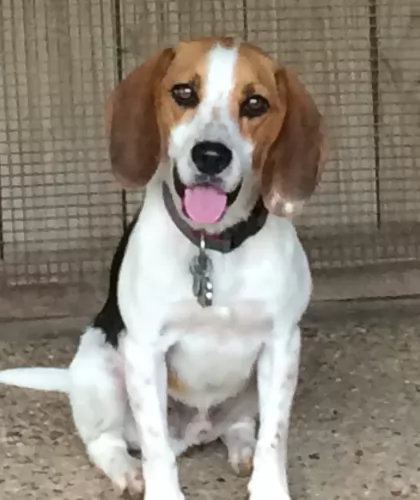 They are very good companion for children. They love to play and spend time with children.
They are very good companion for children. They love to play and spend time with children.
They have millions of scent receptors and so they can be seen in Airports and many important places in duty. Also they are interested in hunting small rodents.
They adapt well for apartment living but they don't like being alone for a long time. If kept alone for a long time in back yard they will begin to bark and dig pit or try to escape. Beagle likes hot weather more than cold weather.
Beagles are difficult to train up. Many people say it will take about one year to house train beagles. They have an attitude of "what's in it for me". But it depends on the personality and temperament of the individual.
The Toy Bulldog was friendly, docile, calm and gentle although tending to be a little bit stubborn.
He no doubt made a wonderful pet and would have been ideal for single people, families as well as older people. He would have made a splendid pet, and would have been an indoor kind of pet.
Not particularly high in energy, he would have enjoyed some exercise just to ensure he didn’t put on weight. He’s extinct now, but there are other popular bull dog breeds, and something of him lives on in these modern bulldogs.
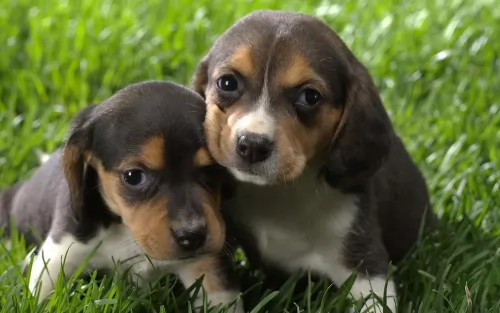 Beagle's ears should be checked occasionally for any sign of infections like discoloured wax, dirt or foul odour. Also their nails should be trimmed regularly. They should be exercised regularly in order to maintain a proper weight. The most common health problems in beagles are obesity, epilepsy and allergies.
Beagle's ears should be checked occasionally for any sign of infections like discoloured wax, dirt or foul odour. Also their nails should be trimmed regularly. They should be exercised regularly in order to maintain a proper weight. The most common health problems in beagles are obesity, epilepsy and allergies.
They are average shedders and having short hair thus it is easy to groom. They should be made to bath with a mild and non irritant shampoo.
It is believed that that these dogs were healthy in their day but were no doubt prone to some canine illness issues just like any other dogs.
They would likely have battled with eye issues such as cherry eye, as well as joint problems.
Cherry eye in dogs may not mean your dog’s life is in danger, but left untreated it can cause bigger eye problems later on.
Unlike a human being, a dog has 3 eyelids, with the 3rd one giving added protection to the dog’s eyes. It’s job is to keep dirt from entering the eyes.
There is a gland in the 3rd eyelid which can move out of place and then it bulges. This is what cherry eye is. The eye becomes irritated and the gland produces discharge. It is best to get your dog to the vet who has the skills and know-how to push the gland back into place.
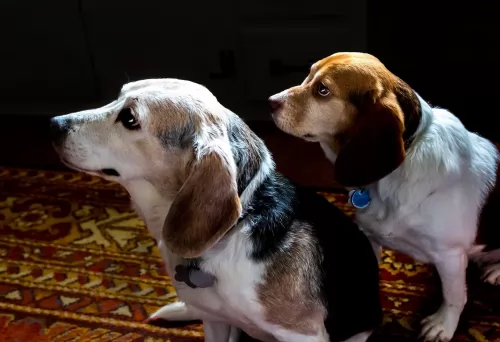 After 4 weeks of birth the puppy can be given solid foods by slowly increasing the ratio for many weeks. The recommended food is fresh meat of chicken breast, lamb, turkey and lean hamburger. The vegetables can be given as raw or steamed. The vegetables that will be good for them are raw baby carrots, broccoli, cauliflower and sweet peas. The puppies should be fed 3 to 4 small meals per day as they require more nutrients for their growth.
After 4 weeks of birth the puppy can be given solid foods by slowly increasing the ratio for many weeks. The recommended food is fresh meat of chicken breast, lamb, turkey and lean hamburger. The vegetables can be given as raw or steamed. The vegetables that will be good for them are raw baby carrots, broccoli, cauliflower and sweet peas. The puppies should be fed 3 to 4 small meals per day as they require more nutrients for their growth.
The grown up dog should be fed with the same food and 1 complete meal is enough for them. The meal should be given at noon. The food should be given based on calories as they should not get overweight. In addition to food, fruits such as blueberries, raspberries, banana and mango can also be given to them periodically.
Beagles should be exercised daily in order to maintain proper weight. Beagles are average shedders and having short hair which is easy to groom. They should be made to bath periodically with a mild shampoo.
Moderate exercise such as walking and cardio exercise such as chasing a ball should be given to them for staying them to be active and for maintaining good health.
The Toy Bulldog would have needed healthy, quality food to remain healthy. It is believed he became extinct in the early 1900s. Maybe there weren't commercially manufactured dog foods then. Their owners possibly tossed them scraps from the table.
Any dog would have to receive a good quota of vitamins and minerals in their food to stay healthy. If the dog was around today, you would read on the packaging label to see what to give him and definitely include some tasty home-made food too.
Nothing spicy and exotic – just plain, boiled chicken, brown rice, sweet potatoes and spinach. Simple foods like this ensure a dog remains free of stomach ailments.
The Toy Bulldog with his short coat would have been easy to groom. He would have required a brush twice a week.
You had to be careful with a dog like this. He didn’t tolerate the heat well. He was not suited for running or jogging and could have developed heat stroke and weakness with his excessive panting. All the huffing and puffing and sweating would have irritated his skin as well.
He would have needed a warm, dry place to sleep indoors. If he went outside, he would have required shade and sunshine to lie in.